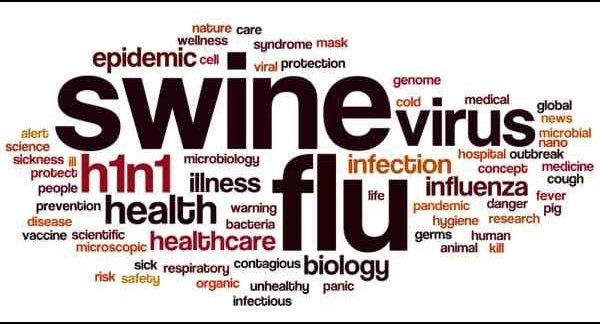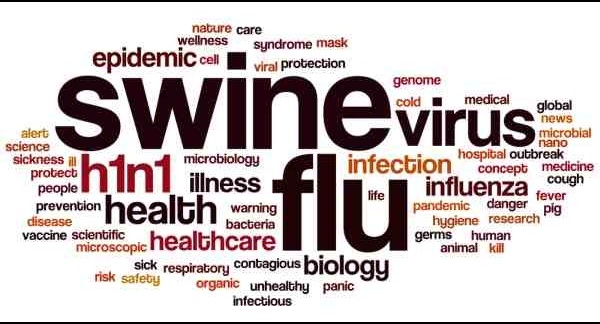With increasing number of Swine flu (aka H1N1 flu) cases in human, this infection is becoming endemic in India. One question might be popping in your mind: Is my pet safe from this deadly disease? The simple answer of this question is No! Dogs, cats and birds can catch as well as spread the H1N1 influenza virus to each other, or members of their human family. In this article, I will explain you all the questions related to the pet swine flu in an elaborative way.
- What is Swine flu?
Swine flu, also called pig influenza, hog flu, swine influenza, and pig flu, is a deadly infection that is caused by any one of several types of swine influenza viruses. Swine influenza virus (SIV) is any strain of the viruses from influenza family that is endemic in pigs. The known SIV strains include the subtypes of influenza A known as H1N1, H2N1, H1N2, H3N1, H3N2, and H2N3; and influenza C. The swine flu influenza virus can replicate itself in dogs, cats, birds and other pets. The Swine flu virus is different from the dog flu virus, which is also known as H3N8 influenza virus.
- Are there any H1N1 infection cases in pets?
There are many H1N1 influenza (swine flu) virus cases are reported in the animals. In 2009, the Iowa Department of Public Health reported the first case of H1N1 infection in a house pet. A 13-year-old domestic shorthaired cat was infected from this virus. Further, the IDEXX Reference Laboratories and American Veterinary Medical Association (AVMA) have confirmed the first US case of the 2009 H1N1 influenza in a dog in New York State.
In addition to dogs and cats, Swine flu virus is also seen in the birds. In August 2009, it was reported that turkeys in Chile were infected with the swine flu H1N1 virus. It is believed that, the turkey birds were infected by a human source. Further, it is not known at this time if humans can be infected with H1N1 from birds.
- Can influenza virus be transmitted from pet to human?
Influenza virus is known for its unique ability to replicate itself in many canines, felines, birds, and humans. Therefore, it seems possible that a pet could transfer a flu virus to a human. To date, there is no evidence of transmission of influenza virus from the pets to people.
According to Dr. Torres, former chief veterinary officer of the United States, "In theory, pets could infect humans, but there is no evidence for that yet," Among many animals, the H1N1 virus does not appear to spread easily that may further suggest that all pets are not the ideal reservoirs for influenza.
- What are the causes and symptoms of Swine Flu in pets?
In almost all the cases of Swine flu in the pets, it is seen that pets were infected by their human household members who had recently been infected with the virus. Pets which have contracted the H1N1 influenza have shown the typical symptoms of the respiratory illness such as decreased appetite, lethargy, fever, runny nose and eyes, coughing, sneezing, and changes in the breathing patterns including labored or difficult breathing.
- Is there any vaccine available for Swine Flu in pets?
At present, there is no vaccine for the H1N1 Swine Flu in dogs. However, there is a vaccine available for a type of dog flu virus called H3N8 which can be spread among dogs through respiratory secretions. It is advised the dog owners to discuss the H3N8 vaccination with their vet as all dogs may not need it. You should note that the H3N8 vaccine will not prevent H1N1 infection (Swine flu).
- What can I do if my pet is showing symptoms of Swine Flu?
If your household members have flu-like symptoms as mentioned above and your pet exhibits respiratory illness, you should immediately contact your veterinarian. You vet will perform appropriate tests, which are meant for Pet Swine Flu, and if found positive your vet will carry out further treatment.
- How to protect pet from Swine Flu?
Our pets live in very close proximity to us. The best way to keep your pet safe from contracting H1N1 influenza is to use preventive health measures routinely within your household. These measures include practicing good hygiene by washing your hands often, and before and after contact with sick individuals. You should minimize your pets’ and your own exposures to the flu sufferers. If you yourself are ill, try to limit contact with your pets to all but absolutely necessary interactions.
During the flu season (after one month of winter season), keep your pets in overall good health with regular preventive health care. Further, you should sneeze or cough into a tissue and dispose of it in the trash and often use alcohol based hand sanitizers before handling pets and pet items.


